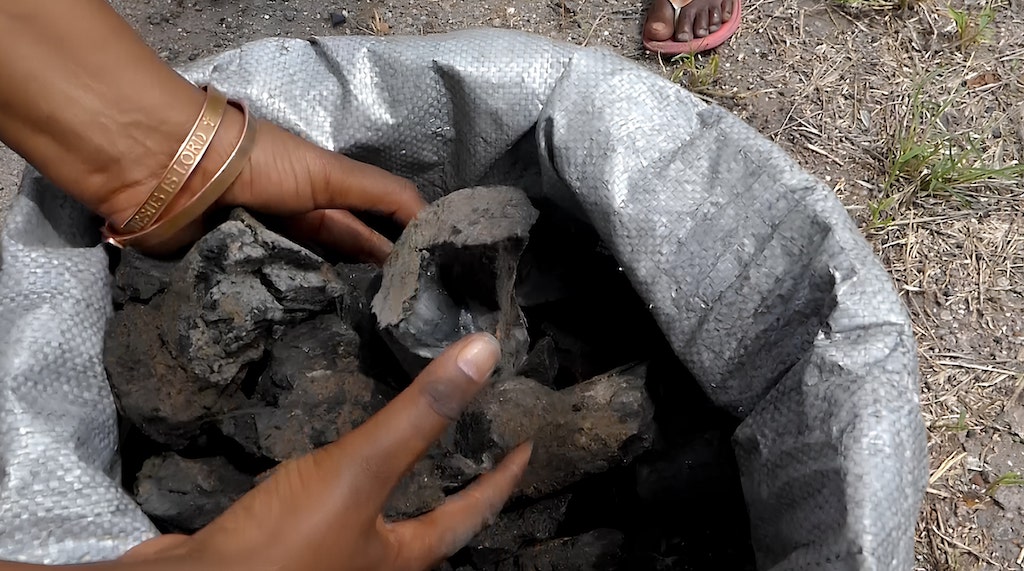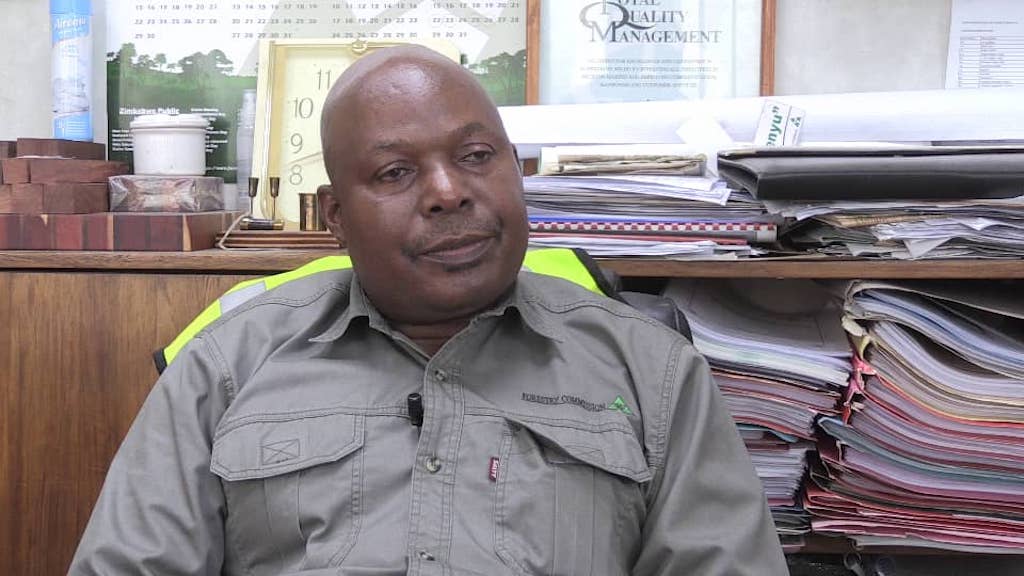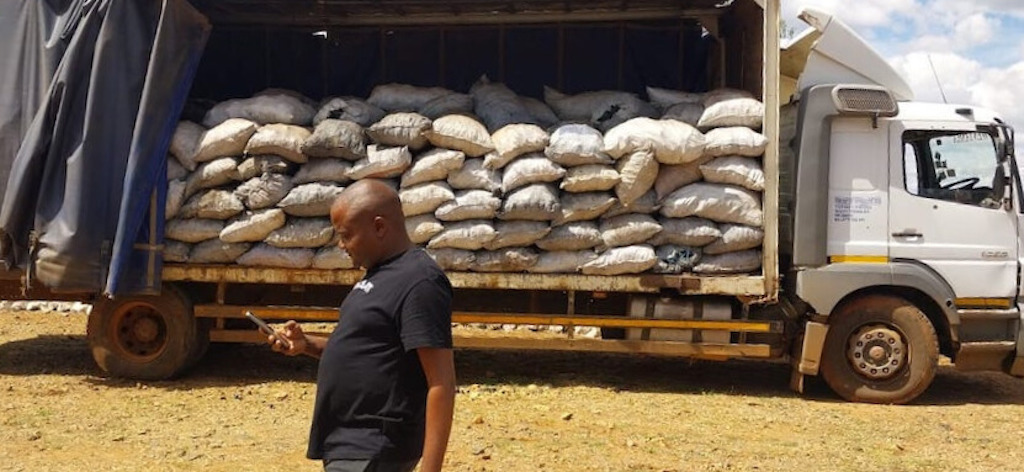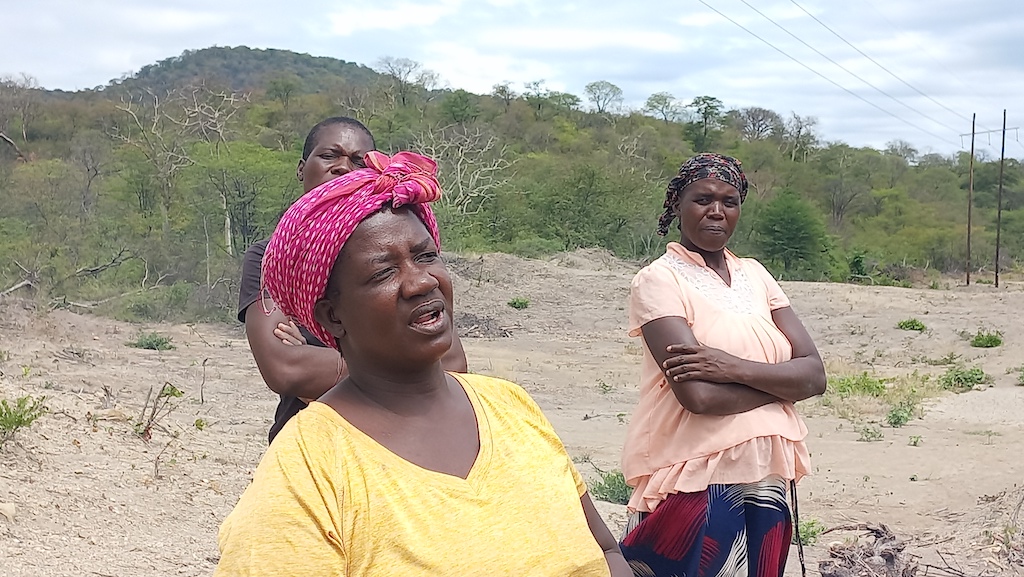
12 Jun The dark light: Zimbabwe’s energy nightmare
Power shortages across the country are fuelling deforestation through the illegal charcoal trade. Nqobile Tshili, Yolanda Moyo and Nkosana Vuma investigate how this network operates
![Burning briquettes: Brenda Sibanda, a firewood and charcoal vendor, is one of many local residents who supply to households across Bulawayo. Photo: Nqobile Tshili]](https://oxpeckers.org/wp-content/uploads/2024/06/20240328_165039.jpg)
Burning briquettes: Brenda Sibanda, a firewood and charcoal vendor, is one of many local residents who supply to households across Bulawayo. Photo: Nqobile Tshili
Zimbabwe’s electricity deficit has been linked to widespread deforestation as illegal loggers are increasingly cutting down trees to produce charcoal, which is sold in major cities such as Bulawayo and Harare.
Desperate to earn a living, locals like 42-year-old Loveness Ncube, a Hwange resident, are frequently arrested and fined by law enforcement officials. Illegally producing charcoal has sustained her family for 20 years.
She revealed that she has become a major supplier to those needing charcoal in Bulawayo. Sometimes, the sellers are forced to pay bribes to move their products.
“While we have clients, it’s no longer easy now we have rangers from ZimParks [Zimbabwe Parks and Wildlife Management Authority] who conduct surveillance and arrest those they find,” she said. “Sometimes you have to pay a bribe just to be allowed safe passage.”
For years, Zimbabwe has experienced significant power shortages largely due to lack of investment in energy generation infrastructure, with the situation changing following President Emmerson Mnangagwa’s rise to power in 2017.
His administration presided over the construction of the Hwange Thermal Power Station Units 7 and 8 Expansion Project, following an investment of US$1.5-billion by China in 2018. It is now the country’s major supplier of electricity, having added 600MW to the national grid.
A quick buck
While the government has made strides to address power shortages, the country still has a deficit of more than 300MW, according to the Zimbabwe Energy Regulatory Authority. Public records indicate that at least 300,000 households still need to be connected to the national grid.
This energy gap has seen a rise in the illegal cutting down of trees, with mopane trees being the main target because the wood is believed to produce the best quality coal. Mopane trees take 35 years to grow fully, but are cut down and burnt within minutes.
Charcoal production is outlawed in Zimbabwe, yet it is openly sold in Bulawayo’s high-density suburbs and, unbeknown to most of its consumers, is causing widespread environmental damage.
Experts worry that if this situation is not averted, the country will lose a huge chunk of land to deforestation. According to the country’s forestry regulator, the Forestry Commission, approximately 330,000 hectares of forestry cover is currently being lost each year.
Matabeleland North is feeling the adverse effects and the commission says more than 14,302 hectares of land was lost in the province through deforestation between 2001 and 2023.
Forestry Commission chief conservator for Bulawayo and Matabeleland North, Armstrong Tembo, linked electricity demand to the thriving charcoal business. He said that “as electricity consumers turn to charcoal, the environment suffers”.
“It’s really devastating, we are talking about hardwood indigenous timber which takes a long time to mature,” he explained. “What is disturbing is these are people that have poached the timber and have had no investment, so for them it’s a quick buck, and they will sell it for a song without giving back to the communities and doing any afforestation.”

Pathetic penalties: Forestry Commission Chief Forester, Armstrong Tembo, said that more needs to be done to curb illegal logging than simply fine offenders. Photo: Nkosana Vuma
Punishment a pittance
Tembo said it has become increasingly difficult to arrest some of the illegal loggers because they “innovate” to evade the law by constantly changing their strategies.
According to him, existing legislation does not deter culprits from committing this crime, time and time again. He even referred to the punishment as “a pittance”.
Zimbabwe’s Forest Act [19:05], created to protect the country’s forests, penalises offenders by handing down fines up to Level 8, equivalent to US$500, or a custodial sentence not exceeding two years in jail. Although arrests have been made, public records show that only fines have been imposed on individuals found to have broken the law.
“When someone is arrested, they pay a fine and go back home and indulge again because fines are not deterrent enough,” said Tembo. “What we are advocating for now is custodial sentences. Hopefully this might awaken the culprits.”

Illegal loads: Law enforcement regularly impounds trucks found to be carrying illegally manufactured charcoal across the country. Photo: Nkosana Vuma
Coordinated criminals
Another hotspot for the illegal charcoal business is Hwange, mostly due to its proximity to the Hwange National Park and Hwange Colliery mines.
Nxolelani Ncube, environment and natural resources officer at the Hwange Rural District Council, called the crime “well-coordinated”.
“Some of the illegal loggers use haulage trucks that would be transporting coal from Hwange Colliery mines to smuggle their products beyond the district,” he said.
Ncube said that as law enforcement agents have turned up the heat against illegal loggers, they have responded by changing their strategy, including operating during the cover of night.
“People are even bringing chainsaws and quite a lot of undesired methods are being used to cut down the trees,” he said.
Although the district council has been running awareness campaigns in collaboration with ZimParks, the Forestry Commission and police, their efforts have not yet yielded any real results.
Ncube explained that there should be more engagement with the judicial system and that “maybe it’s a matter of understanding the magnitude [of the deforestation] and what these trees have to offer us”.
Although it is challenging to stop the demand for charcoal due to power shortages, Ncube suggested people consider adopting renewable energy sources instead. “People in urban areas should try to use biogas digesters, they should use LP gas and solar power, and deviate from using natural resources such as charcoal, which is destructive,” he said.

Hard times: Loveness Ncube (centre) and other charcoal makers say their livelihoods take preference over environmental issues. Photo: Nqobile Tshil
Carbon sinking
Hwange’s dependency on coal makes things challenging for environmental lobbyists.
Daniel Sithole, the executive director of Hwange-based Green Shango Environmental Trust, said more needs to be done to stop deforestation in the town and beyond.
“The reduction of carbon sinking in the forest is a challenge as Hwange is a coal-mining town responsible for fossil fuels,” he said. “We need these trees to make sure they carbon sink our excess carbon while mining is in continuation.”
Carbon sinks help to regulate the climate by absorbing carbon from the atmosphere. This is why having thick forest cover near where coal is mined and burned is so important.
Sithole added that illegal charcoal production is also fuelling human-wildlife conflicts within the Hwange National Park, as communities encroach on animal habitats to seek livelihoods.
For Brenda Sibanda, a charcoal vendor in Bulawayo’s Cowdray Park, environmental issues are far from a concern.
“Most of my clients have not been connected to the national grid,” she explained. Charcoal is also cheaper than liquefied petroleum (LP) gas and firewood. Even those connected to power come to us when there is load-shedding,” she said.
By selling charcoal, Sibanda is able to support her family and pay school fees. She sells a plastic bag of charcoal for US$1, and a 20 litre bucket for US$4.

Harsher penalties
In April this year, Vice-President Constantino Chiwenga said the country is in the process of reviewing its laws to deter forest crimes. He was addressing participants at a human-wildlife conference, held on the sidelines of the Zimbabwe International Trade Fair in Bulawayo.
“The government has taken proactive steps to enhance the regulatory responsibilities of the Forestry Commission,” he said. “The Forest Act has been revised through the Forest Act Amendment Bill, with the aim of strengthening forest protection and combating veld fires through the introduction of mandatory and deterrent sentences. These legislative measures demonstrate our commitment to preserving our precious forests for future generations.”
In addition to this, he said that protecting the environment opens doors for international funding and sustainable protection of the environment.
Nqobile Tshili, Yolanda Moyo and Nkosana Vuma are Zimbabwe-based journalists and alumni of the Oxpeckers #PowerTracker training programme titled The Nexus of Data and Environmental Journalism. This investigation, part of an Oxpeckers series titled ‘The human cost of energy’ is a collaboration between Oxpeckers, The Chronicle and the Zimbabwe Broadcasting Corporation. The collaboration is supported by the Fojo Journalism Education Programme, incorporated under International Media Support and Fojo Media lnstitute’s Media Nexus Programme 2022-2025 in Zimbabwe, funded by Sida
Find the #PowerTracker tool and more investigations here
